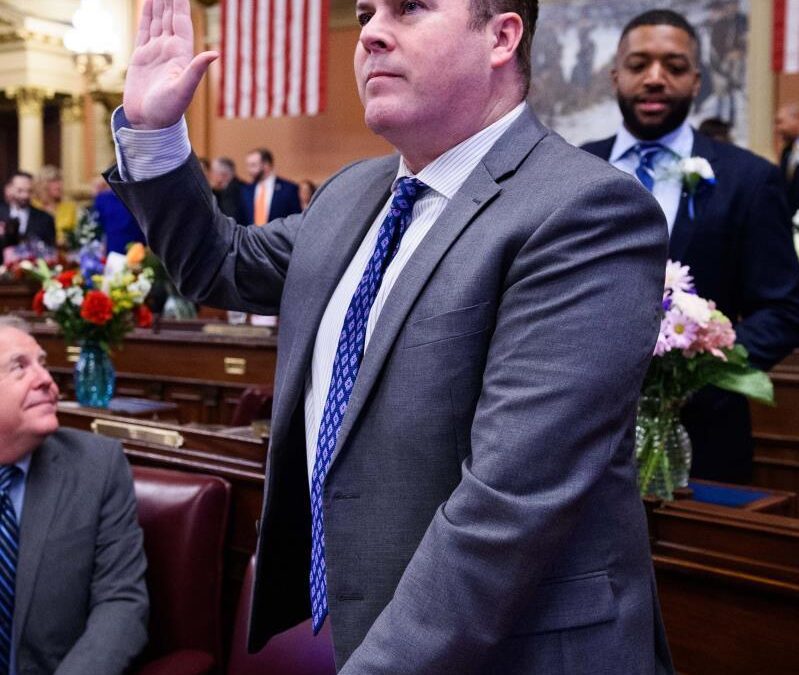
Image via Shutterstock
The We the People legislative agenda, released last month, has been endorsed by 52 incumbent Democrats in the General Assembly. Not a single Republican has gotten on board.
A coalition of Pennsylvania advocacy groups, labor unions, and interfaith organizations are calling on state lawmakers to raise the minimum wage to $15 per hour, pass paid family and sick leave, provide more housing assistance and protections, and create a state-funded public health insurance program accessible to all Pennsylvanians.
The ambitious proposal, dubbed the “The We The People Agenda for 2020,” was rolled out in late July, and aims to address long-standing inequities in key policy areas including work, education, health care, housing, and taxation.
The Pennsylvania Budget and Policy Center (PBPC), a nonpartisan policy research organization focused on promoting fair taxation, was involved in the effort. “For too long, Pennsylvania has been mired politically in what is frankly a corporate-sponsored right-wing agenda—the notion that the solution to every problem is to cut taxes for the rich, cut spending for everyone else, and although they don’t always say this out loud, keep wages low,” Marc Stier, director of the PBPC, told The Keystone. “Our society has been unequal and the inequality has been actually undermining our economic prosperity for everyone.”
Stier specifically took issue with:
- Pennsylvania’s $7.25 minimum wage, which hasn’t increased in more than a decade;
- the extreme inequity in the way the state funds schools, which creates a huge gap in the quality of education that wealthy and poor students receive;
- the lack of adequate funding for colleges and universities, which forces students into huge debt; and
- the state’s unfair tax code, which taxes the top 1% of earners at roughly half the rate of the middle 20%.
These are just a few of the issues that have driven the state’s growing inequality, and rather than act, the Republican-led General Assembly has let the problems fester and worsen, according to Stier. “The state has been treading water while the problems that we’ve identified grow deeper every year.”
The coalition behind the We The People Agenda For 2020 aims to change that. The effort represents the coalition’s second legislative push, following their 2018 agenda that sought to address many of the same issues, which advocates say have only grown more severe amid the coronavirus pandemic.
The coronavirus has devastated Pennsylvania, killing nearly 7,500 residents and infecting more than 122,000. The crisis has also ravaged the state’s economy, as 13% of the state’s workforce found themselves without a job in June, well above the national unemployment rate of 11%. Since March 15, the state has received more than 3.6 million claims between regular unemployment and the Pandemic Unemployment Assistance program, which covers contractors and self-employed individuals who would not ordinarily qualify for benefits.
RELATED: It’s Nearly Impossible for Pennsylvania Minimum Wage Workers to Afford Rent
The scope of the harm has been staggering, and Stier believes it has opened the door for more ambitious ideas included in their proposal.
“The economic crisis created by the pandemic has shown everyone who may not have understood it—because they didn’t know the numbers or because they didn’t live it—that our economy is incredibly unequal and that’s why COVID-19 has affected some people so much more than others,” Stier said. “We’ve seen this horrible inequality in terms of who’s been dying, who’s losing access to health care, who’s losing housing, where food insecurity is occurring, and who’s got access to education.”
Black, brown, and low-income Pennsylvanians have been those most impacted by the pandemic, and the agenda seeks to address those inequities and more.
Frances Upshaw, a board member and economic dignity team member at Power Interfaith, another group involved in developing the plan, agreed that the pandemic had highlighted the urgency of their effort.
“All of these items are very important things and things that folks have been working on for a long time. When the pandemic comes along, then that creates an issue that makes everything else even more in your face,” she told Keystone. “This might be the time to really push to get some of the things that were needed anyway, because now the situation is even worse. You’ve lost your job, you’ve lost your health care as well, you still have your children, they can’t go to school, they’re home. It’s put a lot of pressure on a lot of people.”
Here are some of the proposal’s key measures:
Work
- Create a $15 minimum wage that increases with cost of living;
- Make it easier for Pennsylvanians to form unions and negotiate better wages, benefits, and workplace protections;
- Guarantee that every worker receives paid family leave and sick days.
Education
- Increase state funding for child care, pre-K, and K-12 public schools and fully desegregating Pennsylvania’s schools;
- Increase funding for higher education to make tuition affordable at state and community colleges, so that students don’t go deep into debt to earn a degree;
- Invest in career and technical education, job training, and apprenticeship programs.
Health care
- Create a state-funded public health insurance option for Pennsylvanians, which would end residents’ dependence on employer-based health care;
- Create state-level rules to guarantee no one can be denied health insurance or be forced to pay more if they have a pre-existing condition. These protections are guaranteed by the Affordable Care Act, but would disappear if that law is struck down, as Republicans are fighting for.
Affordable Housing
- Suspend rent and mortgage payments during the pandemic;
- Extend the state’s moratorium on evictions, foreclosures, and utility-shutoffs;
- Invest in new affordable housing units, shelter for the homeless, and programs to improve existing, substandard properties.
Fair Taxes
- Pass the “Fair Share Tax,” which the group says would raise taxes on the wealthiest Pennsylvanians, generating billions from the top 5%, while reducing taxes for 60% of residents;
- End tax loopholes so that large, multinational corporations pay the same rate as Pennsylvania-based companies;
- Create an anti-poverty tax credit to prevent families from being taxed into poverty.
Some of these proposals have already been introduced as official bills, while others are earlier in the process, but will be introduced soon, Stier said. The new agenda already has the support of 52 incumbent Democrats in the General Assembly, along with 24 Democratic candidates, the coalition said.
State Sen. Vincent Hughes (D-Philadelphia) is among those who support the platform.
“The We the People agenda is the sort of progressive, people-focused initiative we should get behind in Pennsylvania. Our goal as policymakers should be working to ensure ‘all Pennsylvanians to thrive, not just survive’ as the agenda says,” Hughes told Keystone in a statement. “It is critical we take this approach in regards to recovery from the COVID-19 pandemic, but also continue to push for economic and social justice going forward. The pandemic did not cause these issues, it exposed just how difficult life can be for some of our people who are often left behind in important policy conversations.”
Hughes did note, however, that while he is committed to ensuring people stay in their homes, he does not believe canceling rent outright and passing the buck to landlords is the correct solution. Instead, he is fighting for state and federal support to ensure renters and homeowners can stay in their homes, while landlords and mortgage companies are also made whole.
“The We the People agenda is the sort of progressive, people-focused initiative we should get behind in Pennsylvania. Our goal as policymakers should be working to ensure ‘all Pennsylvanians to thrive, not just survive’ as the agenda says.”
Gov. Tom Wolf and his fellow Democrats in the General Assembly have previously tried to pass some of these measures, including continuing the six-year-long fight to raise the minimum wage. They also introduced a “worker’s bill of rights” last year to provide paid leave, improve benefits, and make it easier for workers to unionize. But time and time again, Democrats have been met by a brick wall of opposition from Republicans, who control the legislature.
“We have a General Assembly controlled by a Republican Party that is very much unsympathetic to our concerns,” Stier said. “Every year the governor puts forth a budget and for the last couple of years what we’ve said is the governor’s priorities are right, what he’s asking for is right—although he’s not asking for enough—and then the General Assembly basically says no.”
Not a single Republican incumbent has endorsed the agenda yet. Keystone reached out to members of Republican leadership in the General Assembly and a handful of rank-and-file representatives, including Reps. Susan Helm (R-Dauphin), Andrew Lewis (R-Dauphin), and Chris Quinn (R-Delaware), to ask whether they support the agenda.
None of them responded to requests for comment.
These measures will be difficult to implement regardless, given the state’s massive revenue loss during the pandemic. But without buy-in from Republicans, it’s all but impossible given the current makeup of the legislature.
Despite these roadblocks, Stier and Upshaw are optimistic that the groups are making progress and gaining public support, which could ramp up pressure and prompt more lawmakers to endorse the agenda.
“It seems like people are sort of getting it,” Upshaw said. “It seems like everybody wants to know what they can do … everybody is now trying to get on board.”
Politics

Philadelphia DA cancels arrest warrant for state Rep. Kevin Boyle on eve of Pa. primary
Philadelphia District Attorney Larry Krasner said a detective had sought the warrant against Boyle, a Democrat whose district includes a section of...

Influencers and creators find new ways to engage young Philadelphia voters
Rec Philly, a space for creators and influencers, teamed up with Show Up Strong to get hundreds of young Philadelphia residents engaged in the...

New Biden rule protects privacy of women seeking abortions
Under the new rules, state officials and law enforcement cannot obtain medical records related to lawful reproductive health care with the goal of...
Local News

Conjoined twins from Berks County die at age 62
Conjoined twins Lori and George Schappell, who pursued separate careers, interests and relationships during lives that defied medical expectations,...

Railroad agrees to $600 million settlement for fiery Ohio derailment, residents fear it’s not enough
Norfolk Southern has agreed to pay $600 million in a class-action lawsuit settlement for a fiery train derailment in February 2023 in eastern Ohio,...






